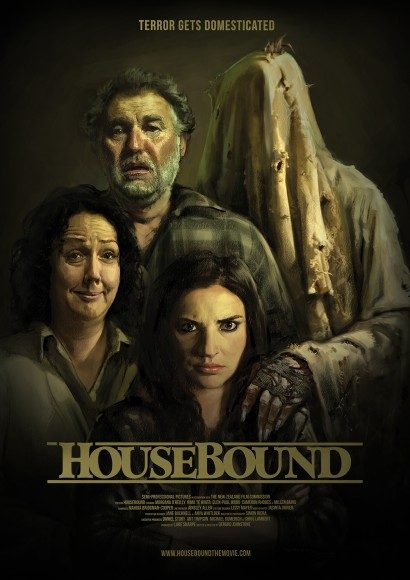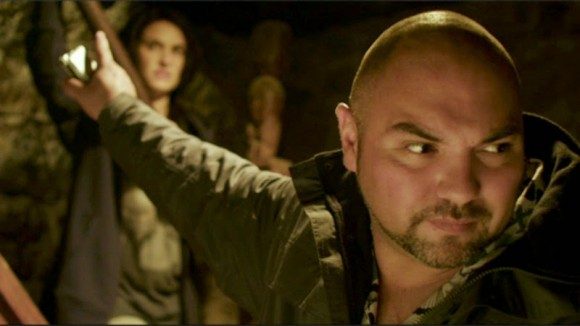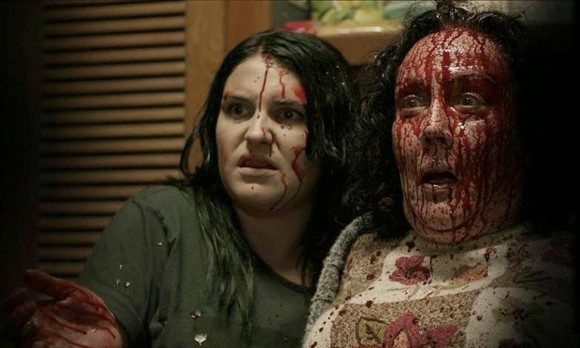It often seems like the horror comedy has ceased to be a subset of the horror genre, and become the norm. This isn’t a new trend; the gore films of the 1970s always had a deliberate tongue and cheek quality that evolved into the forthright satire evident throughout the 1980s. These films always had genuine shock value, and there was always a sense that the emphasis was on the scare. With notable exceptions (The Conjuring comes to mind), the horror films of the 21st century seem to interested in providing as many laughs as they do scares. The fact that Cabin in the Woods, an outright satiric farce, fits comfortably within the mainstream is a testament to the fact that horror films have not just struck a balance with humor, but become inundated with it.
Housebound is a horror comedy. Let me be more specific. Housebound is exactly what a horror comedy should be. In his theatrical debut, writer-director Gerard Johnston takes on the myth of the haunted house. He doesn’t so much dive into this familiar territory, as he does a backflip, simultaneously embracing and eschewing conventions with the poise of a man who truly knows the genre.
Following a botched ATM robbery, Kylie Bucknell (Morgana O’Reilly) is remanded to her childhood home for several months’ house detention. Worse than her state issued ankle bracelet is Miriam (Rima Te Wiata), her estranged mother and certified gossip who swears the house is haunted. Kylie first dismisses these claims as the delusions of her mother’s small-town mind, but soon she begins to hear creaking in the walls and bumps in the night. Maybe she’s inherited Miriam’s superstition, or maybe there really is something ghostly stalking the halls? To find out, she reluctantly teams up with her parole officer / moonlighting paranormal investigator Amos (Glen-Paul Waru) to uncover the dark past of her childhood home.
The haunted house story is a universal one, and with universality comes banality. Johnston knows this and immediately begins to preempt and subvert your expectations and reservations. Housebound’s initial conceit even confronts one of the central problems of the haunted house genre: why don’t they just leave the house? Johnston answers this question before it can even be asked. Kylie can’t leave or she’ll be sent to prison. It’s a simple, logical fix to a problem that’s plagued a number of films, and is demonstrative of a deep understanding of the genre.
Despite this overwhelming proclivity towards self-reflexivity, Housebound never feels glib or tongue and cheek, the way films like Scream and Cabin in the Woods do. It maintains this remarkable sense of sincerity by keeping the film guided by its characters instead of convention. Rima Te Wiata turns in a fantastic performance as Miriam, a woman whose utter inability to connect with her daughter manages to be profoundly heartbreaking, frustrating, and hilarious in equal measure. Morgana O’Reilly plays Kylie with palpable recalcitrance, serving as a wonderful counterpoint to the typical focus of spectral horror, an archetype exemplified by the tame and breakable Eleanor played by Julie Harris in Robert Wise’s The Haunting. When Amos asks her what she’s going to do against a hostile spirit, she replies, “I’m gonna smash it in the face.”
The Verdict: 4 out of 5
Housebound works as a horror comedy because the laughs are almost all born from the characters, not the situations. The narrative is structured like a conventional horror film, it just happens to an off-kilter cast of characters. This not only allows the comedy to feel honest and grounded, but also leaves room for the film to be genuinely scary. Director Gerard Johnston builds an impressive amount of tension, weaving in a deeper story of family, responsibility, and neglect that explodes in a bloody, satisfying ending. Johnston has crafted a horror film that’s smart, funny, and genuinely scary. That’s a combination many directors go their entire careers without achieving.



